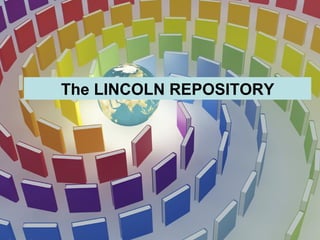Repository Training
- 2. Http:// eprints.lincoln.ac.uk An OPEN ACCESS repository. You LICENSE use of your work. Still need to CHECK publisher policies Quality Control is REPUTATIONAL
- 3. Using the Repository Http://eprints.lincoln.ac.uk Find a paper you have written Log into repository (usual credentials) Check you have rights to upload your paper (if you don’t all is not lost!). Demonstration
- 4. Why Open Access Increases IMPACT Often required by FUNDING bodies Raises your PROFILE. SOCIAL JUSTICE agenda FAIRNESS
- 5. Licences You can only license your own intellectual property. (But others can give you license to share and publish work. And they do.) http:// creativecommons.org /
- 6. Publisher Policies Can often be checked at http:// www.sherpa.ac.uk/romeo / If not, may need to contact publisher direct. If they say no, you can still post “metadata”
- 7. Reputation Why give my stuff away? Little financial value in most academic work. (If it’s valuable don’t give it away!) Open access papers usually get more citations. Helps build research networks
- 8. Repository Services Web page feed Twitter RSS







